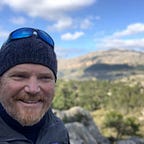We need a land ethic for economic life
“Life in abundance comes only through great love.”
Given that we live in a world in which goods and services that enhance the wellbeing of communities and ecosystems are generally more expensive than those that undermine it — as a result of externalities, subsidies and all the other factors explored in the first module — we are faced daily with ethical dilemmas as consumers.
Similarly, and for the same reasons, investments in economic activities that erode rather then build up social and ecological capital (see module one) are likely to be the most profitable. This presents us with a dilemma: to what extent are we prepared to forego our maximum purchasing power or the highest possible returns on our investments in the service of some other social or environmental objective?
Moreover, as citizens living within a strongly consumerist culture, where worth and wealth are so often insidiously equated with levels of income and consumption, pressure to consume far more than we need — or indeed, than is likely to make us happy — can seem all pervasive.
Nevertheless, the world over and particularly in many Northern European countries, there has been a pronounced rise in the number of people who ask themselves ethical questions about their habits of consumption at the point of purchase.
At this moment of crisis in the history of our species, how can we find work that is meaningful and of service without being overwhelmed by the sheer scale of the task of societal transformation that lies before us? Questions abound as to how we live our lives, what kind of work we do, how we spend our incomes and invest our savings. The remainder of this module will deal with key issues and opportunities in each of these areas in turn.
Important lessons about environmental ethics can be learned from the world’s traditional/indigenous cultures and their traditional ecological knowledge. Many of them managed to create regenerative systems that allowed them to live in a particular place for millennia.
The Indigenous People’s Restoration Network (IPRN) and its approach to protecting bio-cultural heritage and traditional ecological knowledge offer offers a great example of indigenous land ethics and ‘right relationships’ with all life.
“A thing is right when it tends to preserve the integrity, stability, and beauty of the biotic community; it is wrong when it does otherwise.” — Aldo Leopold (1949: 224).
In Western culture, it was the conservation ecologist Aldo Leopold who provided the first modern formulation of an ecological and environmental ethic within the Western cultural context.
Leopold emphasized that ethics is not only a philosophical and social but also an ecological ‘process’. Ethics ultimately concerns the relationship between the individual and the collective, aiming to define and guide appropriate participation in our immediate community, the human family and the community of life as a whole (Wahl, 2016). Leopold argued:
“… the extension of ethics to include [hum]man[ity]’s relationship to the environment” is an “evolutionary possibility” but an “ecological necessity”. As such, “an ethic ecologically, is a limitation of freedom of action in the struggle for existence. An ethic, philosophically, is a differentiation of social from anti-social conduct.” […] “these are two definitions of one thing which has its origin in the tendency of interdependent individuals and groups to evolve modes of cooperation.”
— Aldo Leopold, 1949
Ethics in its wider context is not only about guiding human interactions within exclusively human communities. A solely philosophical ethic, considered only within the social and cultural dimension, is often criticized for moralizing from the position of a single cultural and societal context and set of values. The wider function of ethics — its ecological imperative — extends beyond anthropocentric concerns to biocentric concern for the continuing evolution of life.
…
NOTE: this is an (edited) excerpt from the Economic Design Dimension of Gaia Education’s online course in Design for Sustainability. The first version of this dimension was written in 2008 by my friend Jonathan Dawson, now Head of Economics of Transition at Schumacher College. In 2015–2016, I revised the Design for Sustainability course substantially and rewrote this dimension with more up-to-date information and the research that I had done for my book Designing Regenerative Cultures.
The next installment of the Economic Design Dimension starts on March 19th, 2018 and runs for 8 weeks online. You can join the Design for Sustainability course at any point during the year.
